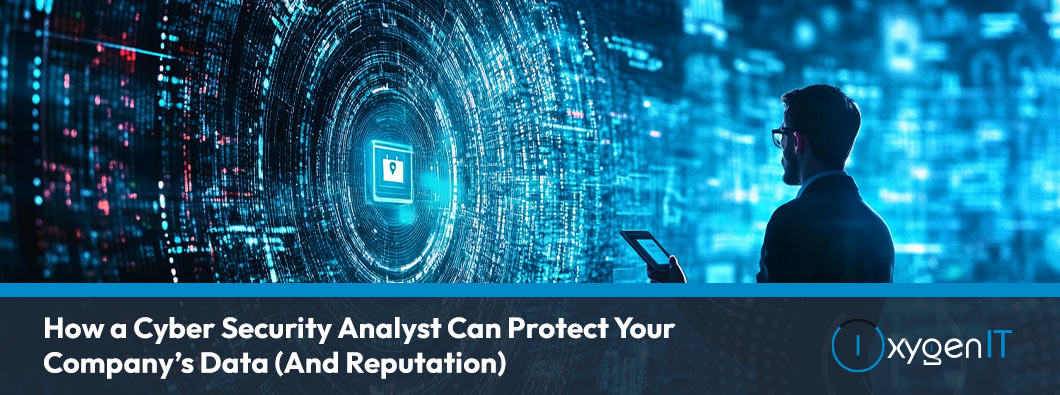It only takes one breach. One overlooked vulnerability. One cleverly disguised phishing email, and suddenly your entire business is at risk.
If you’re like most small to mid-sized business owners, you’re not just juggling operations, staffing, and growth. You’re also silently worrying about cyber security threats you barely understand but know could shut everything down in an instant.
The truth? Cyber security risks for businesses are more than just a tech issue. They’re a reputational, operational, and financial minefield.
And while it might sound like something only the big corporations need to worry about, cyber threats don’t discriminate by size. They target weaknesses, and SMEs are often the easiest targets.
That’s where a cyber security analyst steps in. They’re not just another IT person. They’re your silent shield—monitoring, preventing, and responding to threats before you even know they exist.

What does a cyber security analyst actually do?
A cyber security analyst is your first line of defence against the constant flood of digital threats targeting your business. But they don’t just wait around for problems to strike—they anticipate them.
Think of them as your business’s own digital security strategist. Their job involves identifying potential weak spots across your computer systems and networks, monitoring for suspicious activity, and swiftly responding to incidents when they happen.
Here’s what their day-to-day might include:
- Conducting risk assessments to find vulnerabilities before hackers do
- Installing and maintaining endpoint security, firewalls, and other security technologies
- Running penetration testing to see how secure your system really is
- Watching for and responding to security alerts and incident response triggers
- Helping you create policies and procedures to tighten your defences
- Advising your team on security best practices and awareness
They’re also responsible for gathering threat intelligence, analysing it, and recommending actions to reduce exposure. Many businesses choose to bring on a SOC analyst or work with teams who can monitor systems around the clock through a Security Operations Centre (SOC) setup.
And while not every security analyst comes with a long list of certifications, you’ll want someone who understands frameworks like CompTIA Security+, CompTIA CySA+, or even CISSP (Certified Information Systems Security Professional)—proof that they have the right technical skills and training.
The biggest cyber threats facing businesses today
It’s easy to think cybercrime only happens to massive corporations—the kind that make headlines when things go wrong. But here’s the truth: small to mid-sized businesses are among the most common targets because they’re assumed to have weaker defences.
And when those attacks hit? They hit hard.
Here are some of the most pressing cyber security risks for businesses today:
- Phishing attacks – Fake emails or messages tricking your staff into clicking harmful links or giving up login details
- Ransomware – Malicious software that locks down your data until you pay a hefty ransom (and even then, there’s no guarantee you’ll get it back)
- Insider threats – Former employees or careless staff who unknowingly (or deliberately) cause security breaches
- Weak passwords and lack of security policies – Still one of the top causes of business compromise
- Outdated systems – Old software or unpatched devices that are easy entry points for hackers
What’s worse is that the damage isn’t always immediate. Some breaches lie undetected for weeks or months, silently harvesting data or spying on your computer network.
Without proper information security measures in place—and someone monitoring things daily—you’re left hoping you won’t be next. But hoping isn’t a strategy.
A cybersecurity analyst helps you move from reactive to proactive. They understand how modern cyber attacks work, how to trace them, and—most importantly—how to stop them before they cause irreparable harm.

How a cyber security analyst identifies and mitigates risks
You can’t fix what you can’t see. And most business owners don’t realise just how many vulnerabilities are hiding in plain sight—until a security incident forces them to.
A cyber security analyst works behind the scenes to detect those hidden risks and neutralise them before they evolve into major problems.
Here’s how:
Risk assessments and threat modelling
Every business has a unique setup, and that means unique weaknesses. Analysts start by auditing your current computer systems and networks, identifying where the holes are—whether it’s poor endpoint protection, weak application security, or gaps in security policies.
Real-time monitoring and incident response
Using tools like Security Information and Event Management (SIEM), a security analyst tracks activity across your systems 24/7. They can spot unusual behaviour, like a login from an odd location, and act fast through proper incident response activities.
Penetration testing and simulations
They actively test your defences by simulating attacks to see how well your systems hold up. This form of ethical hacking helps ensure your defences are doing what they’re supposed to.
Implementing best practices and training
A good analyst doesn’t just patch problems—they also guide your team through cybersecurity best practices, like how to spot suspicious emails or why two-factor authentication is a non-negotiable. Many also roll out security awareness training to keep staff sharp and informed.
Creating frameworks for future safety
It’s not just about the now. Analysts help you build a long-term framework for securing your business as it grows, integrating smarter processes and tools into your daily operations.
The cost of ignoring cybersecurity
It’s easy to put off investing in a cybersecurity analyst until a breach forces your hand. By then, the damage is already done.
The cost of ignoring cyber security goes far beyond a few hours of downtime. For many businesses, it means:
- Lost trust – Clients expect you to protect their sensitive information. One leak, and your reputation may never recover
- Operational disruption – Locked systems, lost data, and staff who can’t work—every minute down is money lost
- Financial penalties – In industries like legal or finance, compliance failures and security breaches can lead to hefty fines
- Data recovery expenses – Hiring emergency help to recover your files is far more costly than preventing the breach in the first place
- Business closure – It sounds dramatic, but for SMEs, the blow from a successful cyberattack can be fatal

When and why to hire a cyber security analyst for your business
If you’re reading this and wondering whether your business needs a cyber security analyst, the answer is almost certainly yes.
Here’s when it becomes non-negotiable:
- You handle sensitive information like financial records, legal documents, or customer data
- You’ve recently moved to the cloud or introduced new software and computer systems
- You’re growing fast, and IT issues are becoming more frequent
- You’ve had a scare (or a full-blown breach) and can’t afford a repeat
Hiring a cybersecurity professional is not just about defending against hackers. It’s about building resilience into your business. It’s about having someone with the right skills and experience who can:
- Identify and plug gaps before attackers find them
- Roll out smarter, safer systems
- Train your staff to stop threats before they spread
- Guide your incident response plan so you’re never caught off guard
The best part? You don’t need a huge in-house team to get this level of protection. Many SMEs in Christchurch are turning to the best cyber security consultants to access expert-level support without the overheads.
From entry-level compliance needs to advanced threat intelligence analyst services, a seasoned information security analyst will help you align with global standards, without the tech overwhelm.
Final thoughts
You don’t need to be a tech expert to protect your business. But you do need someone who is.
A cyber security analyst does more than just monitor systems—they give you space to breathe. To grow your business without fear. To stop wondering “what if?” every time you hear about another company facing a security breach or ransomware attack.
The peace of mind you get from knowing your data, your team, and your reputation are protected? That’s priceless.
If you’re a business owner in Christchurch and ready to stop gambling with your security, it’s time to speak to someone who gets it. Someone who doesn’t just tick compliance boxes, but who truly partners with you to reduce risks and strengthen your operations from the inside out.
That’s exactly what you get with OxygenIT—a team of experts with two decades of experience, lightning-fast response times, and tailored solutions that work.
Frequently asked questions
What are the most common cyber security risks for businesses today?
Businesses today face a wide range of threats—from phishing and ransomware to insider risks and outdated systems. These cyberattacks can result in data loss, compliance failures, and damaged reputations. For small to mid-sized businesses, the lack of a solid security team often means these attacks go unnoticed until it’s too late.
How can I find the best cyber security consultants for my business?
Look for firms or individuals with strong cybersecurity skills, a proven track record, and a consultative approach. The best cyber security consultants will take time to understand your business before offering tailored security solutions—not just off-the-shelf fixes. Bonus points if they offer quick response times and satisfaction guarantees.
What’s the difference between a cybersecurity analyst and an information security analyst?
While the terms are sometimes used interchangeably, a cybersecurity analyst typically focuses on external threats like hacking attempts and malware. An information security analyst, on the other hand, often deals more with internal policies, network security, and ensuring compliance with data protection regulations. Many professionals wear both hats.
What certifications should a cyber security analyst have?
Certifications like CompTIA Security+, CompTIA CySA+, or Certified Information Systems Security Professional (CISSP) show a strong understanding of cybersecurity fundamentals. These certifications validate that the analyst has the right skills and experience to manage complex security analyst jobs in New Zealand.
Can I become a security analyst without a degree?
Yes, it’s possible to become a security analyst through hands-on experience and certification paths, though many employers prefer candidates with a bachelor’s degree in cybersecurity, information technology, or a related field. That said, many entry-level positions focus more on problem-solving skills and practical knowledge than formal degrees.
